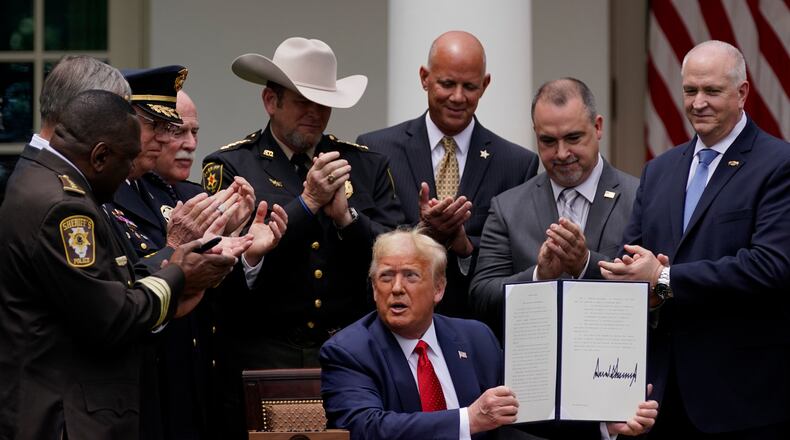Shortly before signing an executive order to encourage more robust training for police and reduce use-of-force incidents, President Donald Trump met privately with the families of several people whose deaths helped spark national protests against police brutality.
Among those guests was Ahmaud Arbery's mother, Wanda Cooper-Jones, and her attorney, Lee Merritt. Arbery was not killed by police, but prosecutors have faced accusations of mishandling the case because of their ties to white men now charged in the fatal shooting of the unarmed African American during a February confrontation near Brunswick.
Trump’s executive order encourages police departments to adopt new professional standards and training protocols by tying the initiatives to federal grants. It also bans the use of chokeholds unless “an officer’s life is at risk.” The president also said the government will encourage the use of “less lethal weapons to help prevent deadly interactions.”
Civil rights groups said the order falls short of addressing the issues they raised in protests.
The Georgia NAACP posted on Twitter that Trump's order would not have saved the lives of Arbery or Rayshard Brooks, a man Atlanta police killed Friday.
It added that Trump “does not have honest intentions about saving black lives” and that his proposals “could result in dangerous consequences for Black people.”
The group also directed criticism, in particular, at Merritt for encouraging his client to travel to Washington in support of the president’s action. It called him an “out-of-state lawyer who does not have deep relationships with our civil rights community.”
Merritt pushed back, posting a picture of him and Cooper-Jones that appeared to have been taken at the White House. He said they didn't meet with the president for a photo opportunity, as some had alleged, but to have a serious conversation in hopes of producing change.
“Show me the civil rights leaders who are upset about families making a direct appeal for federal intervention after the murder of their loved one and I’ll show you a clown,” he wrote.
A spokesman for Trump said the private meeting also included relatives of Botham Jean, a Texas man shot in his home by a police officer who lived in the same building; Atatiana Jefferson, killed after police were called to her home; and Antwon Rose, a teenager killed by a Pittsburgh police officer.
The families did not join Trump for the public event afterward where he spoke and signed a copy of his order, but he addressed them at the beginning of his remarks.
"Many of these families lost their loved ones in deadly interactions with police," the president said. "To all of the hurting families, I want you to know that all Americans mourn by your side. Your loved ones will not have died in vain. We are one nation, we grieve together, and we heal together."
Although the executive order is Trump's attempt to address police brutality highlighted by recent protests, he spent a large portion of the speech defending law enforcement and criticizing some aspects of the demonstrations. The president said that the vast majority of officers deserve praise and respect, even if some change is needed to root out bad ones.
“Americans believe we must support the brave men and women in blue who police our streets and keep us safe,” he said. “Americans also believe we must improve accountability, increase transparency and invest more resources in police training, recruiting and community engagement. Reducing crime and raising standards are not opposite goals.”
The president's actions stop far short of a plan proposed by Democrats in the U.S. House that would make it easier to bring criminal charges against law enforcement officers accused of misconduct, and bans no-knock warrants and chokeholds.
Senate Republicans are also drafting their version of a policing bill that could be unveiled as soon as Wednesday.
MORE: Ga. reps helped lay groundwork for Democrats' sweeping policing bill
xxx
About the Author
Keep Reading
The Latest
Featured



